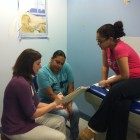I-Team In-Depth
A Survival Tool In Transgender Community, Breast Binders Are In High Demand
|
Requests for free breast binders by transgender youths in 2022 have outnumbered supplies at Health Care Advocates International (HCAI) in Stratford, which serves LGBTQ and HIV communities. HCAI received 126 binder requests in the first three weeks of January alone, crushing last year’s numbers and temporarily wiping out inventory. The group sent out 190 binders in all of 2021. A quarter of them went to Connecticut youths, with the rest shipped nationwide and beyond. “The numbers are jumping because there is such a need,” says Tony Ferraiolo, the Youth & Family Program director at HCAI.



